Business futures in a pandemic world
Explore our COVID-19 Business Impact Dashboard
Expert insights and fresh thinking on how the pandemic might impact the future of work, cities, supply chains, business strategy, society, policymaking, the economy, and specific industries.
Click on a topic to skip straight to the insights.
COVID and work
After many were forced to pivot to remote work, what now for the future of the office? Will the hybrid office protocol prevail? Will workers desiring greater flexibility prevail over organisations pressing for a return to the office?
Reimagining the future of work: what’s next?
Will productivity remain the undisputed focal point of organisations?
25% ⇣
Decrease in the share of collaboration time of Microsoft employees during mandated remote work
Source: Microsoft
64%
Workers new to remote work in the pandemic say it has made balancing their work and personal lives easier
Source: Pew Research Center
2 in 3
Organisational leaders say their company is considering redesigning office space for hybrid work
Source: Edelman Data and Microsoft
76%
Workers believe their company should be doing more to protect the mental health of employees
More on COVID and work
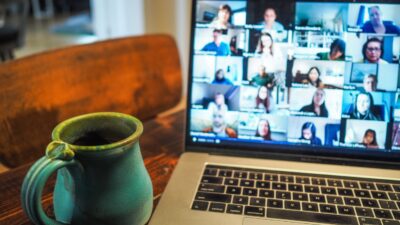
Zoom fatigue: a laborious act, in two parts
Even a few video calls can leave us exhausted, so how do you weigh the potential return on investment of each virtual meeting?

Hybrid office fashion
This week: what should you wear to work: the end of suit and heels and more hybrid office fashion.

Suiting up for a flexible working environment
As we enter into new hybrid work arrangements what we wear to work presents an opportunity to challenge gendered norms.


Digital empathy – what the workers of the world will need to flourish
How will businesses that fail to invest in employee upskilling struggle in the new digitalised world of work?
COVID and the economy
The world economy irrevocably changed in a few short weeks when the pandemic hit. What will the new economic order bring? What can be repaired and what rules should be left to history? What are the innovative solutions for a dynamic and uncertain economic future?
Working out the truth of The Great Resignation
Workers are resigning their jobs at historical rates, but what’s the story behind the statistics?
More on COVID and the economy
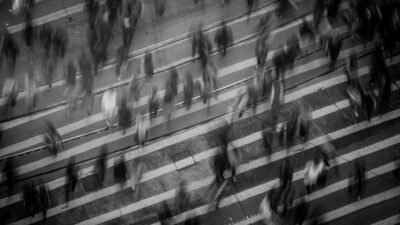

Working out the truth of The Great Resignation
Workers are resigning their jobs at historical rates, but what's the story behind the statistics?
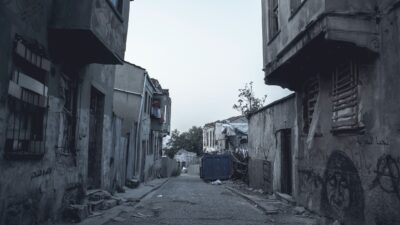

A shrinking middle class, rising global poor
The pandemic has pushed millions out of the global middle class and increased the number of poor.
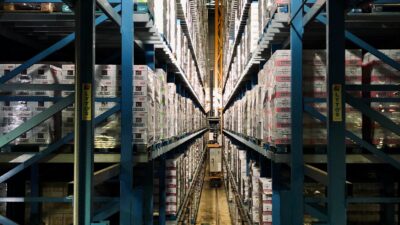

Social, environmental and economic impacts of COVID-19: a snapshot
What has COVID-19 taught us about changes in behaviour and economic activity?


Is COVID-19 the catalyst for increasing impact investments?
Is the social conscience of Australian investors strong enough to increase their impact investments?
Hear how the pandemic is shaping the future of business
Our limited podcast series, Corona Business Insights, includes short audio insights on how COVID-19 is changing the future of business.
Join us as we discuss productivity, telehealth, economic forecasting, the business of vaccines, changing cities and other relevant topics.
COVID and supply chains
The pandemic shook up the world’s supply chains. Will organisations continue to build resilience into their supply networks? What planning strategies will best cope with future freight shocks and natural disasters?
Will there be a shake-up in global supply chains after COVID-19?
Even before the outbreak of COVID-19, neoliberal globalisation was exhibiting signs of ill health, has the pandemic accelerated these trends?
COVID and cities
While the impact on our homes was swift we are still learning how the pandemic will redesign cities. If business districts are the past and remote work the future, how will urban environments and public transport adapt? Will less commuting time create more space for other activities?
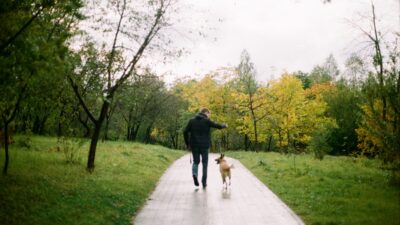

Adding walking to working from home
Does working from home provide an opportunity to reframe active travel choices?
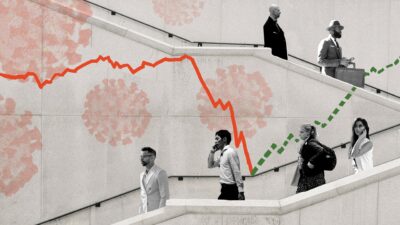

Urban mobility on Corona Business Insights
It only takes sixty days to form a habit, so after nine months of people working from home, how is transport changing in our cities?


Changing cities on Corona Business Insights
How are cities changing and adapting during the pandemic? We talk with urban geographer Dr Dallas Rogers on how COVID-19 is reshaping urban areas.
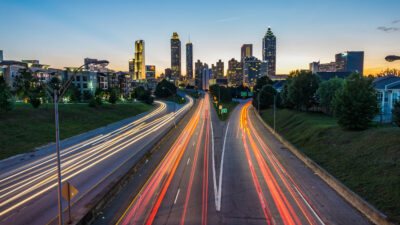

COVID-19’s temporary measures a long-term solution to road congestion
Australians have reduced their weekly household trips by 50%, but what will happen after the COVID-19 pandemic?
Nudging our way through the pandemic
Are mandates needed to counter vaccine resistance? We asked Nobel Laureate and renowned author Professor Richard H. Thaler his thoughts on nudging and effective policy responses to COVID-19.
COVID and strategy
Organisational strategic plans could not have accounted for the scale and impact of COVID-19. But with the wisdom of experience, how will organisations adapt their long-term planning in a transformed global marketplace?
Strategy in a pandemic crisis: how agile is your approach to strategy?
Is it better to have a strategic planning approach or a portfolio-driven approach when planning during a crisis?
COVID and policy
The pandemic necessitated creative responses to manage an all-consuming threat. Which strategies have proven effective and what lessons can we apply to future challenges? Where do good ideas flourish and how can our thinking adapt to the challenges still to come?
Sustainable Development Goals more urgent than ever in a post-COVID world
Prior to COVID-19, there were concerns about achieving the UN Sustainable Development Goals by 2030, a worry that has been clearly exacerbated by the pandemic.
150million
People falling out of the global middle class and into poverty in 2020
Source: Pew Research Center
$11trillion
Money pumped into the economy by central banks in response to the pandemic
Source: Global QE Tracker
More on COVID and policy


Are we there yet? Australia’s bumpy road to SDG 4, achieving quality education
With a robust education system, why does Australia falter on delivering equitable, quality learning for every student?


The future of geopolitics
This week: the future of geopolitics. From Australia’s place in Asia to the war in Europe, we discuss new ways of thinking, with Professor Marc Stears.
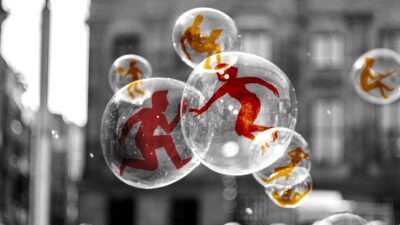

The vaccine passport: the most effective way to remove vaccine hesitancy
How are vaccine passports Australia’s ticket out of wide-ranging lockdowns?


The limits of nudging in the COVID-19 health crisis
Are mandates needed to counter vaccine resistance? We asked Nobel Laureate Professor Richard H. Thaler.
Post-pandemic powerhouse: China is moving on
Four China experts – a businessman, an academic, a diplomat and an economist – walk us through China’s post pandemic story. Is this the start of the Asian Century and how will the world be reshaped by China’s mass strength?
COVID and industries
All sectors are not equal in the force of the pandemic. What industries will flourish and which will flounder? What will be the new jobs, trades and occupations and how will corporations best navigate the transition?
After six months of darkness, what did Chinese cinemas come back with?
Will vengeance watching save the Chinese cinema industry, or will decreasing growth continue as consumers move to streaming platforms?
30%
Australians planning on an international trips for leisure in 2022
51%⇣
Decrease in 2021 movie releases compared to 2019 in the US and Canada
Source: Box Office Mojo via Statista
49%
Retail workers who felt their job security had decreased as a result of the pandemic
Source: University of Sydney
More on COVID and industries


Low-code apps: not just for the IT crowd
The pandemic may have turbo-charged low-code awareness, but how will the market grow in the coming years?


The future of higher education with Mark Scott
This week: what is the future of universities? As the sector navigates disruption and uncertainty, special guest Professor Mark Scott joins us to discuss the future of higher education.


Action? Cinemas are reopening, but will audiences return?
Without new films, audiences and revenue, will there be any cinemas remaining to show films by 2022?
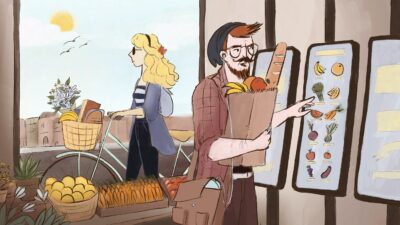

Grocery tourism, entertaining survival plans for your local store
Everyone eats. Grocery shopping will never vanish, but how we transact the action of buying food in store will evolve after the pandemic.
COVID and society
The shared threat forced a new understanding of community responsibility, and there were new rules of engagement. How has the pandemic shifted our attitudes and behaviours? What will this new understanding mean to our relationships and social connections into the future? What will our expectations be of government and of each other?
Social, environmental and economic impacts of COVID-19: a snapshot
What has COVID-19 taught us about changes in behaviour and economic activity?
More on COVID and society



Suiting up for a flexible working environment
As we enter into new hybrid work arrangements what we wear to work presents an opportunity to challenge gendered norms.


Mental wealth – the neglected force in national prosperity
As governments worldwide strive to restore business as usual, do we need to reframe our idea of prosperity?


COVID-19 misinformation spread by just 12 people
What are the disadvantages of individual connectivity at scale?
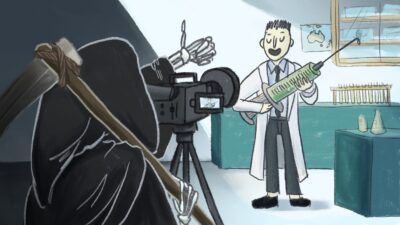

We are not afraid – Australia’s COVID-19 vaccination problem
How can advertising help, or hinder, the rollout of Australia's vaccine efforts?
The way the world works has changed
Things you thought you knew like automation will make our work easier, music is something to listen to, large companies can’t innovate, or data is the new oil are no longer true. Hosts Sandra Peter and Kai Riemer set out to unlearn old wisdoms and discover new ones on The Unlearn Project, a new podcast from Sydney Business Insights.